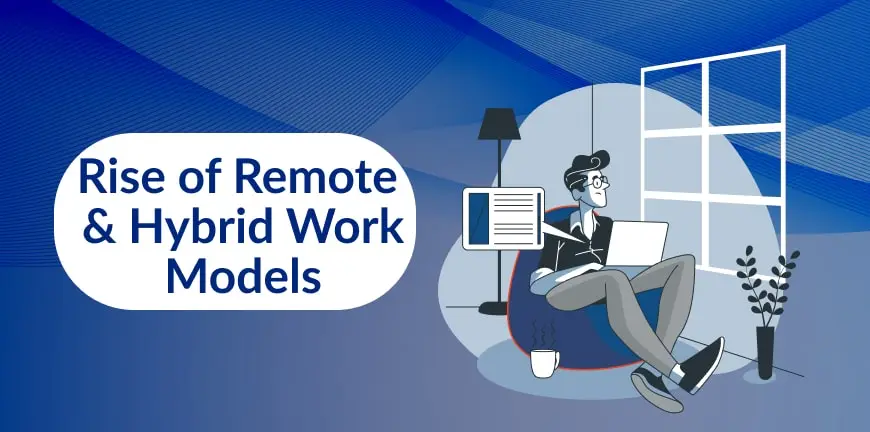
How to Hire a Project Manager? Process, Benefits, Challenges, Skills
26/03/2025
White Collar vs Blue Collar Recruitment: Challenges & Strategies
29/03/2025- The Onset of Remote and Hybrid Work Models
- Economic Impacts of Remote and Hybrid Work Models
- Social and Cultural Shift due to Remote and Hybrid Work
- Impact on Employee Rights
- Technological Support for Remote and Hybrid Workers
- Future of Remote and Hybrid Work
- Remote and Hybrid Work Models A Plus for Employers
- Remote and Hybrid Work Models are here to Stay
What was once considered a temporary solution has now become the norm for millions of employees and organizations across the globe. Due to crisis in health, restrictions by the government and other technological advancements, businesses have had to adapt flexible working models like remote and hybrid models. While often we hear about how individual professionals are benefitting from remote work, it isn’t all one-sided, and there are various benefits of remote and hybrid work models for companies as well.
The Onset of Remote and Hybrid Work Models
The pandemic in 2020 changed the world of work. As companies were forced to shut their establishments physically, they had no choice but to turn to remote work immediately. While employers viewed this as just a temporary fix, employees did not. Many thrived in the environment and also reported better work life balance. By the time the pandemic died down, in 2021, the hybrid work model, a combination of in-office and remote work gained traction. This allowed employees to collaborate but also have the flexibility of working from home.
The two models reshaped global labour markets by modifying the traditional work structures, enhancing employee well-being, operational structures of organization affecting both local and global economies.
Economic Impacts of Remote and Hybrid Work Models
- The remote model facilitates access to a global talent pool due to the elimination of geographical barriers. This has given rise to demand for gig economy jobs, freelancers and independent contractors.
- Some sectors have seen enhanced efficiency while some have faced challenges due to isolation, distractions and lack of infrastructure.
- There has been a number of various new job roles like digital project managers, virtual customer representatives, cybersecurity experts, online education and more.
- Developing countries now have the opportunity to tap into global labour markets.
Social and Cultural Shift due to Remote and Hybrid Work
- Remote and hybrid work models have facilitated better work life balance for employees by reducing their commute time and has also led to environmental benefits. Companies are now more aware of the importance of mental well-being of employees and are taking measures to address it through therapy sessions.
- Unlike the traditional approach, remote and hybrid models have paved the way for a more decentralized management.
- Employers are to put in more effort to foster trust, communication in remote environments.
- To accommodate workers in areas with digital infrastructure inequalities, employers must take up appropriate initiatives.
- Remote work and hybrid work models have been a boon to women as they offer flexible working hours and allows them to maintain a better work life balance.
Impact on Employee Rights
- There is a need for update in labour laws as they must now consider the working conditions of remote, hybrid and traditional office workers. Issues like compensation, remote work hours, safety regulations etc must be taken into account.
- There maybe wage disparities between remote and on-site workers leading to the exploitation of remote workers. Equal pay must be ensured for remote workers across borders.
- While there have been clear indications of higher job satisfaction, its important to maintain clear boundaries between work and life.
- There must be proper policies and contracts in place to avoid the overworking of remote workers and safeguard their rights.
Technological Support for Remote and Hybrid Workers
With video conferencing tools, collaboration platforms like Zoom, Slack and Microsoft team, facilitation of remote work has been made easier.
While there is a concern of increased vulnerability to cyberattacks with the extensive use of remote work technologies, there are appropriate measures that can be taken to avoid it.
AI and automation have helped organizations in streamlining workflows, customer services and providing valuable data analysis.
Future of Remote and Hybrid Work
How remote and hybrid work models will continue to operate in the future will depend on how organizations embrace digital technologies to facilitate easy working conditions of remote workers.
Remote work will revolutionize sectors like education and telemedicine. Remote work will disrupt traditional labour markets and shift economic power toward knowledge-based industries.
There will be more of global migration and economic activity especially in countries like Portugal, Estonia that issue digital nomad visas.
Remote and Hybrid Work Models A Plus for Employers
Its not just employees who benefit from the remote and hybrid work model, employers also have a lot be grateful for.
- Reduced overhead costs associated with office space maintenance, transportation, and other perks.
- Allows employers to hire from across the globe and tap into a skilled global pool of talent as there are no geographical barriers.
- A better work life balance for employees leads to higher employee satisfaction and reduced turnover rates.
- Hybrid model allows employees to be more focused and productive as they have control over the environment they are working in.
Remote and Hybrid Work Models are here to Stay
Despite the many challenges, its established that flexibility is a key priority for many employees and organizations alike. A report from January 2025 revealed that 83% of surveyed employees much preferred work-life balance in their current or future jobs, over better pay. This showed the importance of maintaining hybrid models while addressing the challenges they bring.
Organizations must actively embrace and adapt the remote and hybrid models to achieve highest goals of productivity. To retain talent, companies must redefine their work policies and make it more remote and hybrid work friendly. By communicating clearly, using simple technology and focussing more on the outcomes rather than the hours employees put in, are critical components of effective hybrid working strategies.
Contact Us For Business Enquiry

Rajkumar Shanmugam
Rajkumar Shanmugam is the Head of HR at ALP Consulting, bringing over 19 years of comprehensive HR leadership experience across India and international markets. His expertise spans talent acquisition, employee relations, performance management, compliance, and HR transformation. Rajkumar has a proven track record of driving people-centric initiatives, enhancing workplace culture, and aligning HR strategy with business goals. With extensive experience in US staffing operations and global mobility, he continues to lead organizational excellence through innovation and employee engagement.




